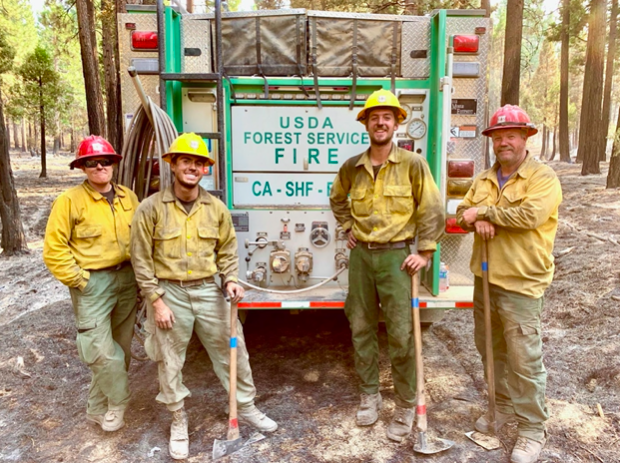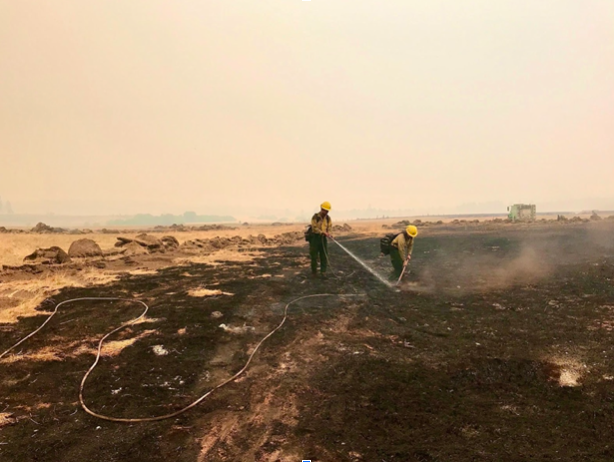“You know it’s funny, but the job can really be like night and day.” A pause. “It can seem monotonous, and even almost boring for a second—and then suddenly, it can turn full-fledged dangerous. One wrong move and someone can really get hurt or even worse… There’s such a drastic contrast that you wouldn’t really expect.”
I nod, unsure of what to say. I have never been faced with a situation in which death lingers nearby, ready to capture the distracted or the fallen. Let alone have it be a part of the work I do every day. So, I simply nod and say, “I can’t imagine.”
Maxwell Curry is a 22-year-old seasonal wildland firefighter. He is from San Diego, California and is currently serving in Hayfork, California, a small census population just outside Redding. He has been working in this area since early May, right after he graduated from college.

But even though he is located in Hayfork, Curry and his team are dispatched to fires in other cities or even states on a regular basis. Just recently, they were battling the infamous Loyalton fire.
One can only admire the hard and dangerous work that wildland firefighters do. They are putting their lives at risk to protect the lands and the people in this country. They are helping save lives.
“What is going through your head when you are fighting a fire?” I ask.
Curry thinks for a second. “Well, I always try to remember that every fire is different. You cannot trust the framework you’ve built and apply it to every fire. That can be dangerous. So, you have to be aware of your surroundings in case things take a turn for the worse.”
“And what if they do?”
“Well, we try to be prepared. We always have escape routes. And we try to apply the LCES principle, which stands for lookout, communication, escape routes, and safety zones . So, before even going into the fire we are prepared.”
When we think of wildland firefighters, we think of the risk they face every day. However, we should also think of the other sacrifices they are making; which are a lot.
“Sacrifice in this job comes in many forms. I mean, from what I have seen it is difficult to have a normal life. You do not really have anything outside of this job. Right now, my work is my life. So, I cannot even imagine what it is like to have a family while being a full time firefighter.”
“I think having and raising a family is hard enough with a normal job,” I respond. “So I can’t think of what that must be like.”
It is also important to remember that wildland firefighters do more than protect the lives of the people in this country. They also protect the planet we live in and its valuable resources.
Wildland fires destroy everything in their paths. The vegetation, the wildlife, the trees, etc. Just this year, more than 4 million acres of ecosystems have been burned in the U.S. alone. That number would be much higher if it weren’t for the brave firefighters that risk their lives to put them out.
These wildfires are really harmful to our planet. The ecosystems they touch can be severely transformed after a fire. Since important vegetation that composes an ecosystem is burned, erosion can occur. This erosion affects the soil, as well as the vegetation that grows in this ecosystem. A once biodiverse ecosystem can become the complete opposite of that after a wildfire. All the weakened plants and trees that survive a fire are exposed to other threats such as fungus and disease. So, the problems can continue, even long after the fire is treated.
The survival of the animals that inhabit these ecosystems are also threatened. Not only can they lose their homes, but also their main sources for food. Many different species are threatened by wildfires.

And even further, water supplies can be badly affected as well. After erosion occurs, the soil becomes hydrophobic, which means it cannot absorb water. The hydrophobic soil promotes the movement of debris that may end up polluting valuable bodies of water. Harmful waste that can contaminate these water sources is difficult to filter and can cost a lot of money.
And because our planet is made up of several elements, the air can be contaminated as well. There are both immediate and long-term effects on the air quality of an affected area. Smoke particles, carbon monoxide, and hazardous materials can be launched into the air with harmful effects to both the environment and human health. It is important that people avoid being near fires or burned areas to avoid breathing in anything that can cause damage to their lungs.
So, as we have seen, fires are truly destructive. And once again, if it weren’t for the work wildland firefighters do, our planet would be in deeper trouble. They protect our valuable resources and ensure that our ecosystems continue flourishing.
It is also important that we recognize one of the more central problems: the people on this planet. According to a recent statistic, over 80% of wildfires are caused by the carelessness of humans.
So please, be careful. Do not contribute to this harmful phenomenon. Help protect the planet, help protect the communities, and help protect the lives of those dedicated to fighting fires.
“So Max, tell me, what inspired you to pursue this career?”
He smiles. “I mean, I always thought the work was honorable. I thought the work and the sacrifice people had to do was something to value. I wanted to contribute to that.”
Lately, wildfires have become something of a staple story in our daily news. The problem seems to be worsening with every passing year. So, while we unite and do our part to help fight this natural disaster, let’s remember those who are out there doing this honorable work in the meantime. Because as Max said, that is truly something to value.
Follow all of Green Living‘s content online and on social media.





